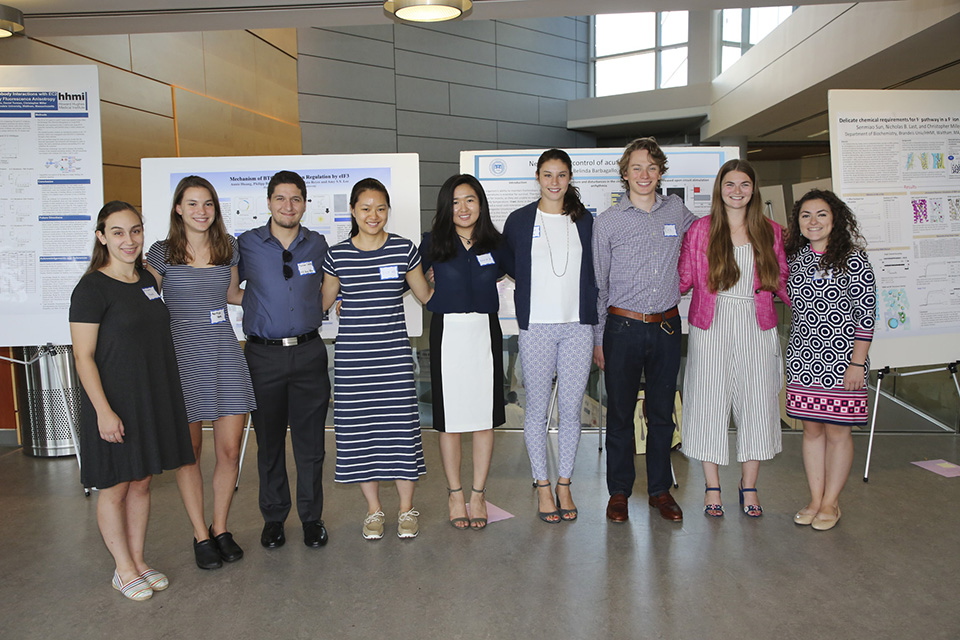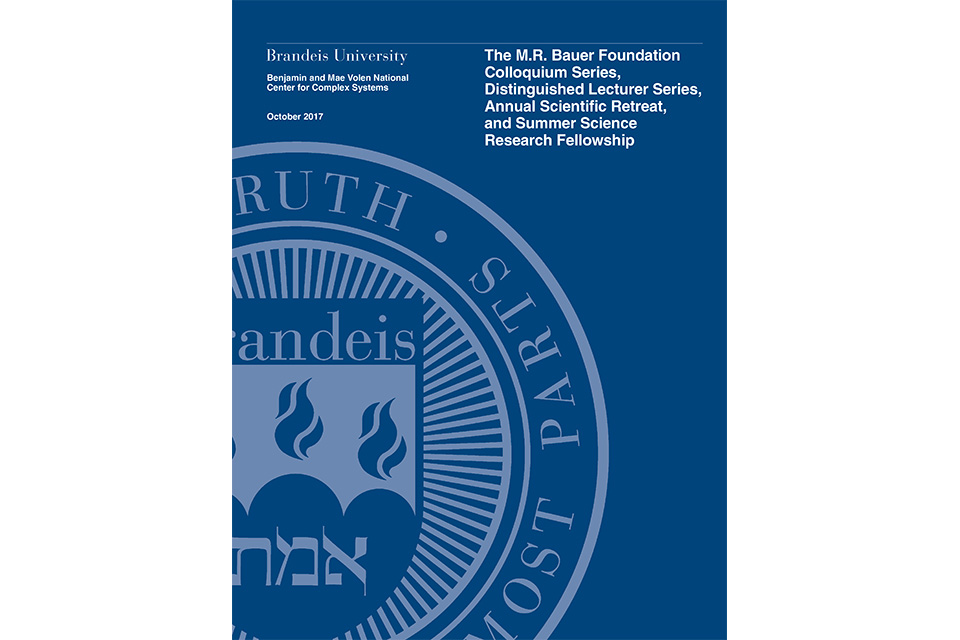2016-2017 M.R. Bauer Foundation Summary
Colloquium Series, Distinguished Lecturer Series, Annual Scientifc Retreat, and Summer Science Research Fellowship
In these challenging times, science serves as bedrock and lodestar. The importance of pushing the boundaries of knowledge forward is ever increasing.
Science is the foundation upon which we build knowledge and policy — a complex world requires that we ask good questions and resolve challenges with tested solutions. While the public domain can be raucous, reason remains a guardrail against excess.
Science is needed now more than ever, and can be more influential than ever before. Science is illuminating every aspect of the world, from nanoparticles and neurons, to space. Scientific discovery still has the capacity to transcend the commonplace and the mundane. We are wise to remember that research can be a source of inspiration for everyone.
Scientists are fulfilling these dual roles — ambitious investigators on the one hand and champions of reason on the other — with aplomb and skill. We are communicating the compelling features of our work and speaking to the emotional appeal of science. Our response to these new responsibilities fills me with optimism.
Proudly, Brandeis is cultivating aspiring researchers who adhere to the most rigorous standards and are capable of promoting science. They are demonstrating daring, courage, and resilience. They, too, give me hope for the future of neuroscience and the place of science in society.
The M.R. Bauer Foundation recognizes the importance of training emerging scientists and replenishing faculty, and we are honored that the Foundation invests in the Volen Center and the Division of Science. The impressive assortment of Foundation-sponsored programs, detailed in this brochure, benefit the Brandeis community and those with whom we work. It is a cherished partnership that has ongoing and lasting impact.
Each of us is an ambassador of science. Together, we are bringing science to the world, changing our respective fields, and preparing those who will inherit, and advance, our discoveries.
Leslie C. Griffith, MD, PhD
Nancy Lurie Marks Professor of Neuroscience and
Director, Volen National Center for Complex Systems
Expand All
The human brain comprises tens of billions of neurons that form intricate neural networks. Our ability to walk, move, learn and think, are dependent upon proper functioning of these networks (disease and dementia can result from their disruption). Proper understanding of how the networks are regulated, and how they can be disrupted in disease, are necessary in order to pave the way for new treatments that can slow, arrest, or reverse the effects of disease.
The 2016-17 M.R. Bauer Foundation Colloquium Series explored new developments in the understanding of the brain: how we learn, how we pass our knowledge onto our progeny, how we are rewarded for behaviors, and how neural compromise leads to disease. Seven distinguished scientists offered unique insights into the processes of learning and memory, reward, and the effects of stress and aging on neurons. Each speaker has presented a summary of his or her work, which is preceded by a brief introduction (in italics) explaining the presentation in a more general framework of synaptic transmission in the face of a plastic, changing brain.
Giovanni Bosco, PhD
Oscar M. Cohn Professor, Department of Molecular and Systems Biology, Dartmouth Geisel School of Medicine
Gerald Rubin, PhD
Vice President, Howard Hughes Medical Institute, and Executive Director, Janelia Research Campus
Rick Morimoto, PhD
Professor, Department of Molecular Biosciences, Northwestern University
Daniel Wesson PhD
Assistant Professor, Department of Pharmacology and Therapeutics, Case Western Reserve University
Franck Polleux, PhD
Professor, Department of Neuroscience, Columbia University
Leo Belluscio, PhD
Senior Investigator, Developmental Neural Plasticity Section, National Institute of Neurological Disorders and Stroke National Institutes of Health
Ravi Allada, PhD
Edward C. Stuntz Distinguished Professor, Chair, Department of Neurobiology, Northwestern University
Every year, the M.R. Bauer Distinguished Lecturer program brings to campus two renowned visitors who spend a full week at Brandeis. These weeklong visitors present talks to small and large groups, visit center laboratories, and engage students, postdoctoral fellows, and faculty in informational and highly interactive conversations about shared areas of research interests. This year, our esteemed lecturers were Huda Y. Zoghbi, a professor at the Baylor College of Medicine and an investigator with the Howard Hughes Medical Institute; and Casper Hoogenraad, a professor of cell biology from Utrecht University.
Huda Y. Zoghbi, MD
Ralph D. Feigin Professor, Baylor College of Medicine, Investigator, Howard Hughes Medical Institute, Director, Jan and Dan Duncan Neurological Research Institute at Texas Children’s Hospital
Casper Hoogenraad, PhD
Professor, Department of Molecular and Cell Biology, Utrecht University
The Volen National Center for Complex Systems held its annual scientific retreat on October 17, 2016. The event took place at the Charles River Museum of Industry and Innovation in Waltham, Mass. This year’s theme was “Dynamics of Complex Systems.” Emery Brown, from the Massachusetts Institute of Technology was our keynote speaker and he wrapped up the day with his seminar about the effects of anesthesia on the unconscious brain. In addition to Dr. Brown, we invited four new Brandeis assistant professors to discuss their work in complex systems. (Unfortunately, Amy Lee had to cancel due to illness.)
Holding the retreat off campus encourages the faculty, students and postdoctoral fellows who attend to interact in new ways. Being removed from familiar surroundings fosters connections and communication that lead to interdisciplinary and innovative collaborations that are much less likely to occur in the daily confines of the lab.
As the summaries on the following pages make clear, the 2016 retreat offered a view at the amazing research being pursued at Brandeis. Each project brings a better understanding of the complex systems around us.
The Volen National Center for Complex Systems Scientific Retreat
Schedule
October 17, 2016
8:30 a.m.
Arrival and Check-in
9:00 a.m.
Maria-Eirini Pandelia, Brandeis University
“Digging Up Nature’s Mechanisms: Surprises by Enzymes With Novel Metallocofactors”
10:00 a.m.
Ben Rogers, Brandeis Univeristy
“Using DNA to Program Pathways in Complex Self-Assembly”
11:00 a.m.
Poster Session
12:30 p.m.
Lunch
1:30 p.m.
Keynote Speaker
Emery Brown, MIT
“The Dynamics of the Unconscious Brain Under General Anesthesia”
2:30 p.m.
Break
2:45 p.m.
Tijana Ivanovic, Brandeis University
“Influenza Membrane Fusion: Insights From Single Virions Into Potential Avenues for Viral Evolvability”
3:45 p.m. (Cancelled)
Amy S. Y. Lee, Brandeis University
“EIF3-Directed Translation Regulation During Cell Growth and Differentiation”
4:45 p.m.
Departure
The Volen Retreat offers the opportunity for all Volen-affiliated faculty, postdoctoral fellows, and graduate and undergraduate students to present a poster detailing their research. This is an opportunity for other members of the community to engage with their fellow scientists and exchange ideas. The face-to-face format of a poster session allows for direct and detailed discussion of data and techniques.
This year, 19 postdoctoral fellows and students presented posters, as listed below.
| Presenter |
Poster Title |
| Daniel Acker |
Controlling seizures by molecular manipulation of inhibitory synapse formation |
|
| Ramin Ali Marandi Ghoddousi |
Delineating the active circuit involved in taste-associated learning and memory |
| Katelyn Daman |
Elucidating the mechanism by which the GTPase Rem2 negatively regulates dendritic complexity |
| Maitreya Das |
Construction and analysis of CRISPR-mediated KO models for KCNV1 in Pyramidal Neurons |
| Steve DelSignore |
The Lowe Syndrome phosphoinositide phosphatase dOCRL restricts innate immune activation by regulating endosomal traffic |
| Danielle DiTirro |
A Tubby Tale: Sensory signaling and membrane composition in C. elegans cilia |
| Nadya Greenberg |
Motor resonance predicts dominance and behavior |
| Jessica Haley |
The effects of acute changes in pH on central pattern generating circuits |
| Anna Hartmann |
Weighting of antagonistic sensory pathways underlies behavioral response valence to olfactory cues |
| Munzareen Khan |
The GCY-29 receptor guanylyl cyclase shapes AFD-mediated thermosensory signaling in C. elegans |
| Kang Liu |
Gradation of synaptic strength by quantal addition of structural modules |
| Jacqueline McDermott |
The role of Class 4 semaphorins and plexinB receptors in GABAergic synapse formation |
| Nathaniel Miska |
Independent regulation of 'feedforward' vs. 'feedback' E-I ratio following visual deprivation in a canonical V1 microcircuit |
| Anna Moore |
Rem2 regulates distinct homeostatic mechanisms in visual circuit plasticity |
| Sarah Richards |
Loss of SRGAP2A broadens tuning in primary visual cortex of the mouse |
| Asuka Takeishi |
Molecular and neuronal mechanisms of feeding state-dependent thermotaxis behavioral plasticity |
| Alejandro Torrado Pacheco |
Bidirectional firing rate homeostasis in V1 of freely behaving rodents |
| Nick Trojanowski |
CaMKIV, homeostatic plasticity, and firing rate set points |
| Rylie Walsh |
Retromer regulates APP-exosomes at the Drosophila NMJ |

The M.R. Bauer Summer Science Research Fellowship Program began on May 30, 2017 and culminated with each of the Fellows presenting a poster at SciFest VII on Aug. 3, 2017. For the fourth consecutive summer, the M.R. Bauer Foundation’s gift supported undergraduate research projects. In 2016, ten budding scientists got an opportunity to conduct research in laboratories at the Volen Center for Complex Systems, which enabled these very talented undergraduates to tackle important research questions. More importantly, the M.R. Bauer Summer Undergraduate Research Fellowships supported the growth of each recipient as a scientist. As you will read in each Fellow’s personal statement, the opportunity to pursue research this summer was life changing. These students not only gained practical experience and skills, but also developed as students and scientists. According to undergraduate student Miriam Hood, “The M.R. Bauer Fellowship not only facilitated the progress of my research, but has given me the time to build a strong foundation for a future in scientific research.” Fellow Jessie Moore echoed these sentiments. She said, “Participating in this program has strengthened my passion for research and further driven my goal of contributing to science.” Undergraduate Sabrina McDonnell also values her experience. She stated, “The funding I received enabled me to delve deeper into my project and become more confident in my abilities as a researcher.”
It is due entirely to the generosity of the M.R. Bauer Foundation that these young scientists were able to experience what truly comprises laboratory life and science during the summer of 2017.
Christopher Armstrong, Krauss Laboratory, Department of Chemistry
Abraham Cheloff, Miller Laboratory, Department of Biochemistry
Abigail Daniels, Garrity Laboratory, Department of Biology
Richard Haburcak, Xu Laboratory, Department of Chemistry
Lily He, Marder Laboratory, Department of Biology
Miriam Hood, Theobald Laboratory, Department of Biochemistry
Annie Huang, Lee Laboratory, Department of Biology
Sabrina McDonnell, Hedstrom Laboratory, Department of Biology
Jessie Moore, Griffith Laboratory, Department of Biology
Kaitlyn York, Wingfield Laboratory, Department of Psychology
As always, we thank the speakers who came to Brandeis this past year to share their research and to engage us in hours of stimulating discussions with Volen Center faculty, students and postdoctoral fellows. We are also grateful to our visitors for forwarding to us their lecture summaries that form the basis of this report.
We especially acknowledge Kim MacKenzie, a past neuroscience PhD graduate, for her valuable contributions and editorial assistance in the preparation of this report.
The text of this summary of the Bauer Foundation series, along with summaries from previous years, can be found online.
Office of Communications
©2017 Brandeis University J047

